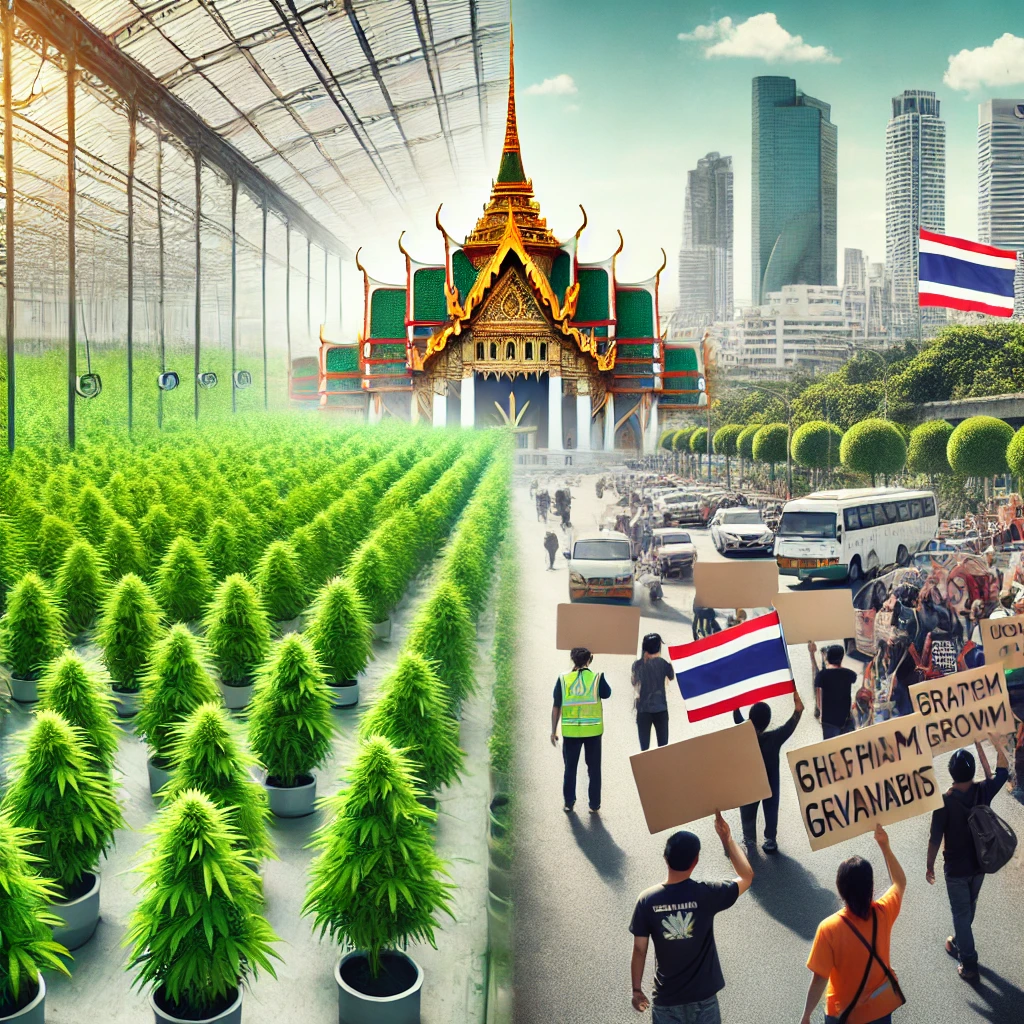In Thailand, cannabis reclassification to a narcotic has sparked significant debate, balancing public health concerns with economic impacts.
BANGKOK, Thailand — In a surprising turn of events, Thailand’s Committee for the Control of Narcotic Drugs has approved a proposal to reclassify cannabis as a narcotic, effective January 1, 2025. This decision marks a significant shift from the country’s previous stance, which saw Thailand become the first Southeast Asian nation to decriminalize cannabis in 2022.
The Decision and Its Implications
The reclassification proposal, approved by the Ministry of Public Health, aims to categorize cannabis and hemp as Category 5 narcotics, with exceptions for medical and research purposes. This move has sparked a heated debate among policymakers, healthcare professionals, and the public.
Dr. Surachoke Tangwiwat, Deputy Permanent Secretary at the Ministry of Public Health, stated that the reclassification is necessary to control the recreational use of cannabis, which has been a growing concern since its decriminalization. “The facts should be established and laid out for the public to see,” said Prasitchai Nunual, Secretary-General of the Thai Cannabis Future Network.
Public Reaction and Protests
The decision has not been without controversy. On July 8, 2024, around a hundred cannabis legalization advocates marched to Government House in Bangkok to protest the reclassification. The protest, organized by the Thai Cannabis Future Network, called for a comprehensive study on the impacts of cannabis before any reclassification.
“We have no other way to return cannabis to the people except to change the policy,” said Prasitchai Nunual. The network plans to continue its protests, urging the government to reconsider its decision. This movement reflects the strong public sentiment against the reclassification, highlighting the community’s desire for a well-informed and balanced approach to cannabis policy.
Economic and Medical Impact
The reclassification could have significant economic implications. Thailand’s cannabis industry, which has seen rapid growth since decriminalization, may face setbacks. Entrepreneurs and businesses that have invested in the cannabis market are concerned about the potential loss of revenue and jobs. The thriving cannabis sector, seen as a new economic frontier for Thailand, now faces an uncertain future.
On the medical front, the reclassification could limit access to cannabis-based treatments. While the proposal allows for medical and research use, stringent controls may hinder the availability of cannabis for patients who rely on it for therapeutic purposes. This shift could affect thousands of patients who have turned to cannabis as a viable treatment option for various ailments. Medical professionals and patients alike are apprehensive about how this policy change will impact their access to essential treatments.
A Step Backwards?
Critics argue that the reclassification is a step backwards for Thailand, which had positioned itself as a leader in cannabis reform in Southeast Asia. They contend that the decision is driven by political motives rather than scientific evidence. Opponents of the reclassification believe that it undermines the progress made in cannabis policy and sets a concerning precedent for future drug policy decisions.
However, supporters of the reclassification believe it is a necessary move to address the social and health impacts of widespread cannabis use. They argue that the previous policy lacked adequate regulation and oversight, leading to potential public health risks. These proponents assert that stricter controls are needed to safeguard public health and ensure responsible use of cannabis.
Looking Ahead
As the January 1 deadline approaches, the debate over cannabis reclassification in Thailand is likely to intensify. The government faces the challenge of balancing public health concerns with the economic and medical benefits of cannabis. Policymakers will need to navigate this complex landscape, considering the diverse perspectives and interests involved.
For now, the future of cannabis in Thailand remains uncertain. Whether the reclassification will achieve its intended goals or face significant pushback from the public and industry stakeholders is yet to be seen. This contentious issue highlights the ongoing struggle to find a balance between regulation and the benefits of cannabis. The outcome of this debate will undoubtedly shape the future of cannabis policy in Thailand and potentially influence other countries in the region.

Thailand’s decision to reclassify cannabis as a narcotic has sparked a significant debate, highlighting the tension between public health and economic growth. As the situation develops, it will be crucial to monitor the impacts on the cannabis industry, medical access, and broader societal implications. The outcome of this reclassification will undoubtedly shape the future of cannabis policy in Thailand and possibly influence other countries in the region.
This decision brings to the forefront the complexities of drug policy and the varied impacts on society. It underscores the importance of informed policymaking that takes into account scientific evidence, economic implications, and the well-being of citizens. The journey of cannabis in Thailand continues to evolve, and this latest development is a critical juncture in its story.
***
Trap Culture is the ultimate destination for cannabis enthusiasts who want to experience the best of Arizona’s cannabis culture. Whether you are looking for the hottest cannabis-friendly events, the latest news about everything from psilocybin legislation to trends in the industry, or the most exclusive and limited-edition products from the top brands in the market, Trap Culture has you covered. Visit our website to learn more about our events, our blog, and our store. Follow us on social media to stay updated on the latest news and promotions. Join the Trap Culture family and experience the most immersive and engaging cannabis-friendly social events in Arizona.


